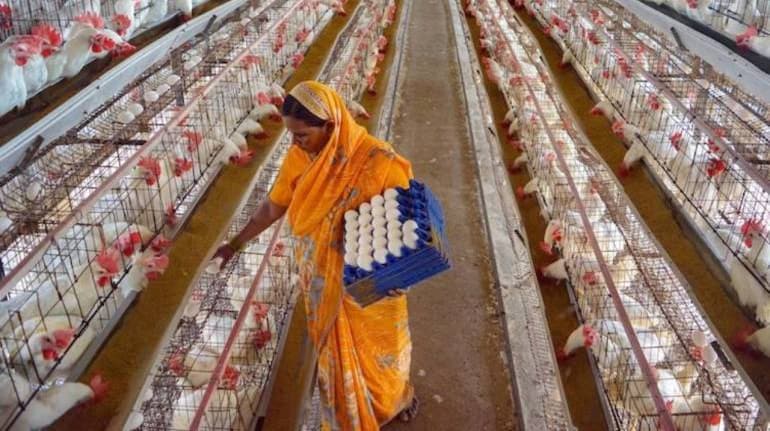



Egg and poultry consumption has slowed in some parts of the country but there is no sign of panic yet as aviation influenza, or the bird flu, has left hundreds of thousands of birds in Kerala, Rajasthan, Madhya Pradesh and Himachal Pradesh dead, posing a challenge to India's Rs 1.75 lakh crore industry.
“Consumers are showing some signs of nervousness going by the sales trend over the last two days. We feel consumption has slowed by 10-15 percent,” a poultry retail supplier, who didn't wish to be identified, said in Chennai.
The bird flu was first reported in Rajasthan over the last weekend but it has been reported to be severe in Kerala, where more than lakh birds, including ducks and chicken, were culled in Alappuzha and Kottayam districts on January 6.
Kerala has declared the outbreak a state disaster and deployed rapid response teams for culling and surveillance. Madhya Pradesh has banned poultry from other states, while Himachal Pradesh has barred the sale and export of poultry products in four subdivisions of Dehra, Fatehpur, Jawali, and Indora.
Haryana and Gujarat have also reported cases of bird flu, caused by the influenza virus that affects only birds. The disease is caused by migratory birds and humans can be affected if they come in contact with infected poultry or surfaces.
No human has been reported affected by the outbreak yet in India.
Also read: Bird flu: 12 epicentres identified in four states
The Indian poultry sector plays a key role in the economy with the market for its products valued at Rs 1.75 lakh crore. Its compounded annual growth has been projected at 16.2 percent between 2019 and 2024.
Industry officials in Namakkal, the hub of India’s poultry sector where 3.08 crore eggs are produced a day, said the outbreak has not had an impact.
“There has been no impact, including in Kerala, due to the bird flu. Our eggs and poultry meat continue to be sent to that state,” said Tamil Nadu Egg Poultry Farmers Marketing Society (PFMS) president Vangili Subramanian.
At least 80 lakh eggs and 10-15 lakh kg of poultry meat is sent to Kerala daily from Tamil Nadu, through Nagercoil, Theni and Pollachi regions.
Signs of nervousness are evident from the price being reduced to Rs 4.85 per egg on January 7 from Rs 5.10 on January 6 at Namakkal, which sets the benchmark. Prices were ruling at Rs 5.10 since January 2.
Similar trends are being witnessed across the country in places such as Bengaluru, Hyderabad, Ludhiana, Bhopal and Lucknow but prices in Kolkata are firm at Rs 5.71 since January 3.
“Egg prices are being lowered to ensure that stocks do not get built up. The current trend is a bit concerning after a good six-month period we witnessed,” said R Sridhar, a poultry dealer in Tamil Nadu’s Tiruppur district.
“Poultry meat prices have dropped by Rs 10 at farmgate. Prices are ruling below Rs 80 depending on where the farmgate is,” said the Chennai retail supplier.
For example, prices of live bird in Krishnagiri in Tamil Nadu that borders Karnataka and Andhra Pradesh are ruling at Rs 72 a kg, while they are a tad higher in places such as Palladam in Tamil Nadu’s Tiruppur district.
In retail, chicken in Kerala was quoting at Rs 114 a kg on January 6 against Rs 119 during Christmas.
“We have lowered the prices since we are witnessing some resistance from consumers after the rates topped Rs 5,” said a National Egg Coordination Committee (NECC) official.
“Egg and poultry prices go up and down every week. If you look up at data, you can see prices going up twice a week and down similarly,” said Tamil Nadu Poultry Farmers Association (TNPFA) president K Singaraj.
Singaraj and Subramanian said that poultry products were being consumed without any problem in South India. “Our products continue to go to Kerala. Only Kerala poultry products cannot come into Tamil Nadu,” the PFMS president said.
The Chennai retail supplier said small poultry producers would feel the impact even if there was a marginal drop in prices. “Currently, a truckload of about 2,200 poultry birds fetches Rs 3.5 lakh against Rs four lakh earlier this week,” he said. Each bird weighs 2-2.1 kg.
The fall may not affect large poultry players, who produce over one lakh birds a week, but small producers, who produce about 10,000 birds a week, could come under pressure.
“The cost of producing a bird for a small producer is Rs 80 a kg, while for large players it could be at least Rs 10 less,” he said.
However, the industry is not unduly worried over the long-term prospects. “Such outbreaks and market shocks have happened often in the last 10-15 years. When the news of the outbreak appears in the media, consumers react negatively. But things improvd later on,” said Tiruppur dealer Sridhar.
The poultry sector is also confident that it has drawn some important lessons from last year when there was a sudden slump in consumption on rumours that linked chicken to the spread of the novel coronavirus.
Then, the price of an egg dropped to Rs 2, while chicken rates slumped to Rs 27-29 a kg. Since then, the poultry sector has come a long way.
Discover the latest Business News, Sensex, and Nifty updates. Obtain Personal Finance insights, tax queries, and expert opinions on Moneycontrol or download the Moneycontrol App to stay updated!
Find the best of Al News in one place, specially curated for you every weekend.
Stay on top of the latest tech trends and biggest startup news.